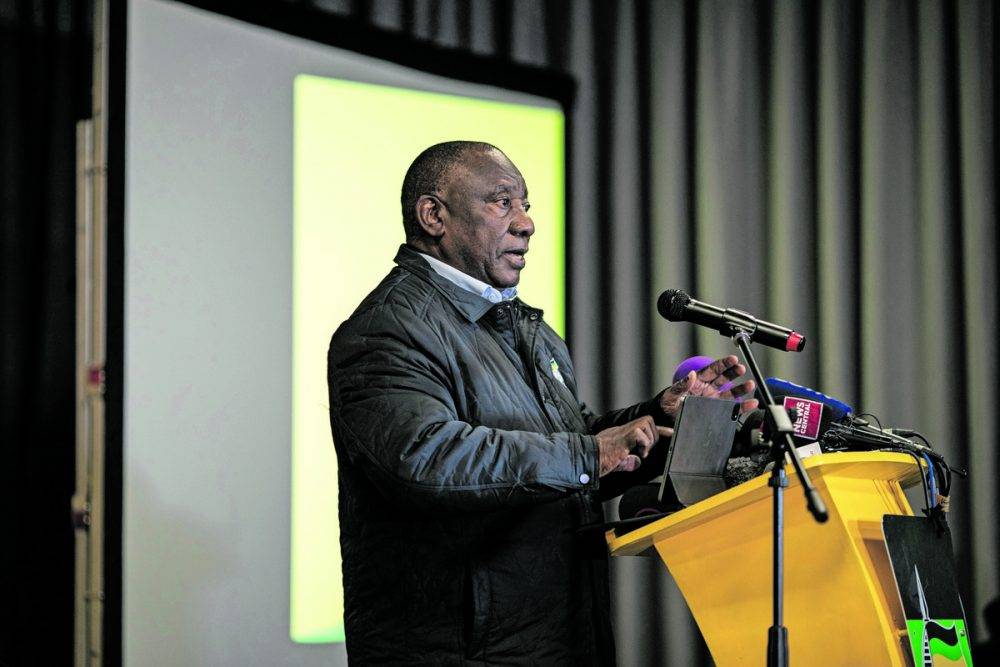Ramaphosa’s enemies in the ANC voted for Jacob Zuma — and got John Steenhuisen instead. (Waldo Swiegers/Getty Images)
Thursday.
It appears that those among us who predicted that 2024 would be another 1994 were at least partially right.
The conditions are different.
The ANC was being nice in 1994.
Today it’s desperate to cling to power and has turned to its former foes to form an administration — but there is, as we speak, a government of national unity in the process of being constituted.
It’s looking like more of a sparkling coalition than an actual government of national unity if one is to be honest.
Both the Economic Freedom Fighters (EFF) and the uMkhonto weSizwe (MK) party appear to have landed themselves on the outside — but one works with what one has.
The second 1994 all right, but not for Julius and uBaba.
Back in Nelson Mandela’s day, the barrier to entry to the unity government was 10% of the vote in the first democratic elections.
Today, it appears to be a willingness to abide by the Constitution — and the election outcome — along with an ability to negotiate, rather than holding the process to ransom.
And the common sense not to miss the bus — politically and legally speaking — by doing so.
Other things are different.
Back then, the Inkatha Freedom Party (IFP) had to be dragged, kicking and screaming, into the negotiations that led to the formation of Mandela’s government of national unity.
Today, the IFP’s swords have been hammered into ploughshares — politically speaking — and others have taken on the spoilers role.
The IFP has been first to confirm its decision to serve in an ANC-led government at national level and to work with it, the Democratic Alliance (DA) and the National Freedom Party (NFP) in KwaZulu-Natal and Gatueng. The details are still being worked out, but IFP president Velenkosini Hlabisa’s announcement on Wednesday night was the first real indication that the process was over the hump.
An agreement between the four parties and their other national partners — the Patriotic Alliance and Rise Mzansi at this stage — would deliver Cyril Ramaphosa the presidency and the IFP’s Thami Ntuli the premiership in KwaZulu-Natal.
The deal would also resolve the issue of speaker and deputy speaker, with the further detail as to who gets what in cabinet and the legislatures left to be resolved by the time the swearing-ins get underway at 10am today.
Nationally, the deal looks done, despite the crying foul from some in the ANC and its alliance partners, who know that their influence — and their cabinet seats — are on their way out the window.
As Hlabsia put it on Wednesday night, they will have to get used to it.
There was still a chance that the NFP might swing towards working with Jacob Zuma’ss party and the EFF in KwaZulu-Natal when the vote for premier takes place.
The NFP was still making up its mind at the time of writing — which, combined with the potentially mixed loyalties of some of the ANC members of the legislature — could deliver a hung legislature (or one led by the MK party) when the secret ballot took place.
They eventually went with the GNU.
Ironically, the political realignment may also give Ramaphosa more of a chance of actually finishing his second term as president of the country, unlike both of those who came before him.
Zuma and Thabo Mbeki were recalled as head of state after changes in the ANC presidency after its national elective conferences.
It may even be more difficult for the party to fire a president who serves at the behest of a coalition — and not simply at theirs — after the ANC conference in December 2027.
Ramaphosa will have to make it that far.
 Strange friendship: President Cyril Ramaphosa. (Per-Anders Pettersson)
Strange friendship: President Cyril Ramaphosa. (Per-Anders Pettersson)
The backlash against the ANC turning of the leaderboard rather than ideology is on, but Ramaphosa has the numbers in the party’s national executive committee, which was sitting to sign off on the deal on Thursday evening.
A risky move ahead of the 2026 local government elections, but the ANC’s new partners there — they have dumped the EFF in the metros and will be looking to their new coalition partners — may limit the damage at the polls.
The irony of Ramaphosa getting a second term in office courtesy of his former opponents rather than his comrades, many of whom voted for the MK party while pretending to campaign for the ANC, is delicious.
The Zuma sleepers in the ANC must be cursing themselves.
They voted for the MK party to get rid of Cyril — and keep the DA out — by costing the ANC its majority and blaming him.
They ended up — for now — with themselves and the MK party firmly in the margins and Cyril and John running the show.
After all, one gets what one votes for.